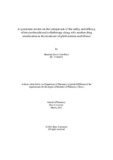A systematic review on the comparison of the safety and efficacy of temozolomide and radiotherapy along with another drug combination in the treatment of glioblastoma multiforme

View/
Date
2022-03Publisher
Brac UniversityAuthor
Chowdhury, Shamima ZerinMetadata
Show full item recordAbstract
Glioblastoma multiforme is one of the most dangerous primary brain tumors, with a poor prognosis even after vigorous treatment. Neurosurgical enhancements, the discovery of potent chemotherapeutic medicines, developments in radiation and innovations in targeted delivery have all contributed to an increase in the extension of survival in patients. This systematic review incorporates 12 clinical trials and presents a concise evaluation of studies where temozolomide, radiotherapy along with other drugs are used in collaboration to treat glioblastoma and efficacy outcomes, rate of tolerability, and patient life expectancy are recorded, investigated, and reviewed to discover which combination treatment leads to an extended survival time or minimal side effects in patients. High dose radiation and TMZ had the longest OS and PFS with moderate toxicity. (Temozolomide+ Radiation+ 06 Benzylguanine + Carmustine + Plerixafor) also had the longest median OS and the fewest adverse effects, indicating that the study was effective. Although it considerably increased patient survival, (TMZ+ radiation + TSC) had the lowest amount of toxicity. (Temozolomide+ irinotecan+ bevacizumab) showed the highest rate of side effects, despite having a good OS and PFS.
